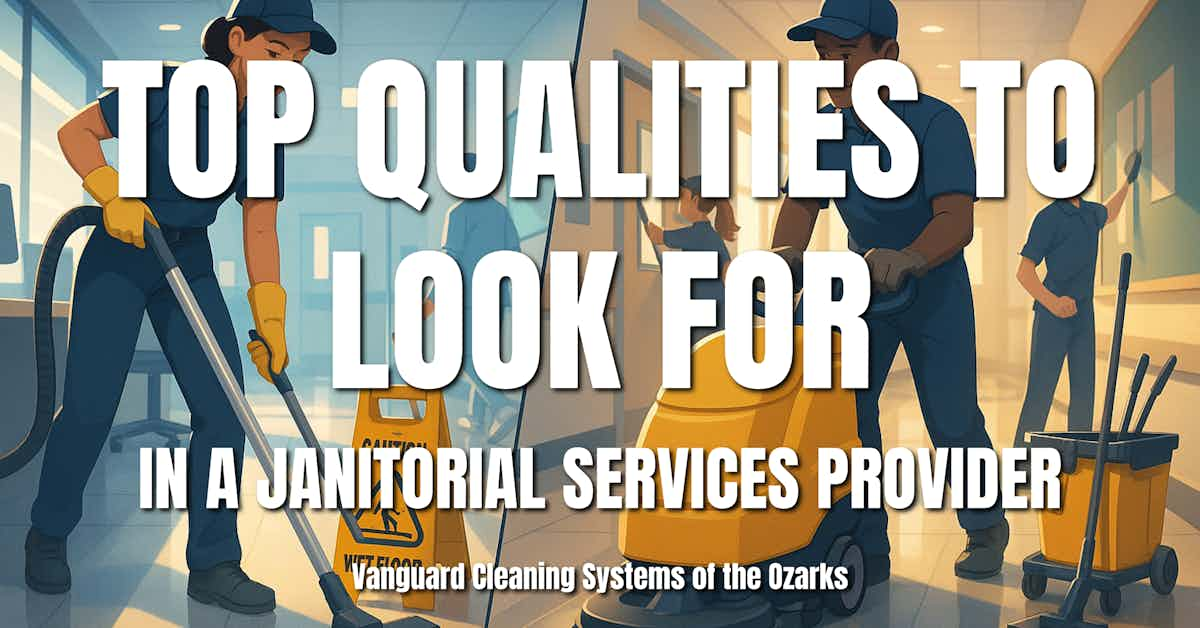A great janitorial provider doesn’t just clean your space—they protect your brand, your people, and your peace of mind.

What Sets a Janitorial Provider Apart?
Not all cleaning services deliver the same value. While many promise spotless floors and sanitized surfaces, few consistently meet the standards that define professional, high-quality janitorial care. The difference lies in the details—how staff are trained, how safety is managed, how communication flows, and how problems get solved. If you’re looking to partner with a provider that goes beyond surface-level service, it’s essential to know what qualities truly matter.
Thorough Staff Training
Training is the foundation of reliable, high-quality janitorial service.
- Structured programs reduce mistakes. Cleaning staff must be trained in safety, disinfection techniques, chemical handling, and infection control—especially in high-risk environments like healthcare or food service.
- Role-specific instruction matters. Teams should be trained based on the areas they clean—offices, restrooms, kitchens, or ICU units—so they can meet the specific requirements of each space.
- Refresher courses maintain consistency. Ongoing training ensures employees stay current on updated protocols, equipment use, and evolving industry standards.
Well-trained janitors work faster, safer, and more effectively. They know how to properly sanitize high-touch surfaces, follow PPE guidelines, and apply procedures that protect both building occupants and their own health. It’s not just about knowing how to clean—it’s about knowing how to clean correctly, every time.
Clear Standard Operating Procedures (SOPs)
Professional cleaning starts with clear direction. Standard operating procedures provide that structure.
- SOPs ensure consistency across teams. Written protocols outline what gets cleaned, how often, and with what products—eliminating guesswork.
- They reduce liability and improve safety. Clear steps for chemical handling, waste disposal, and emergency response help prevent accidents and compliance issues.
- Accessible documentation supports accountability. When expectations are documented and visible, it’s easier to monitor performance and correct issues.
A reliable janitorial provider follows SOPs daily—not just during inspections. These procedures guide quality control, reduce service gaps, and help every team member meet professional standards, regardless of shift or location.
Strong Employee Satisfaction and Retention
Satisfied employees deliver better service—and that starts with how they’re treated behind the scenes.
- Supportive work environments build loyalty. When janitors feel respected and valued, they’re more likely to stay and take pride in their work.
- Low turnover leads to consistent quality. Experienced staff understand routines, client expectations, and safety protocols better than new hires.
- Positive morale boosts performance. Happy teams are more motivated, detail-focused, and committed to maintaining high standards.
Ask providers about their staff retention rates, employee support programs, and recognition practices. A provider that invests in its people is far more likely to deliver dependable, high-quality service day after day.
Workload Management and Fair Staffing
Even the best-trained janitors can’t perform well if they’re stretched too thin.
- Balanced workloads prevent burnout. Overloaded staff are more likely to miss details, cut corners, or make safety errors.
- Proper staffing improves consistency. When tasks are divided fairly, each space gets the attention it requires without sacrificing quality.
- Workload tools increase efficiency. Reliable providers use scheduling systems or workload calculators to match staff availability with service demand.
Fair staffing isn’t just about numbers—it’s about supporting your facility with the right people, at the right time, doing the right tasks. It keeps service levels high and protects both staff health and your business reputation.
Reliable Use of Personal Protective Equipment (PPE)
PPE is a frontline defense—for workers, clients, and the cleanliness of your facility.
- Consistent PPE use reduces health risks. Gloves, masks, goggles, and uniforms protect janitors from exposure to chemicals, pathogens, and bodily fluids.
- Proper training ensures effectiveness. Staff must know how to put on, remove, and dispose of PPE without contaminating surfaces or themselves.
- Readily available equipment signals professionalism. Providers that supply and monitor PPE use demonstrate a clear commitment to safety and compliance.
A quality janitorial provider treats PPE as essential—not optional. When protective gear is worn correctly and consistently, it safeguards the people doing the work and reinforces the integrity of the environment they’re maintaining.
Transparent Quality Control Systems
Accountability separates average cleaning providers from professional ones.
- Routine inspections keep standards high. Scheduled audits catch missed tasks, reinforce protocols, and provide measurable performance data.
- Feedback loops drive improvement. Client input, when tracked and addressed, helps providers correct issues quickly and maintain trust.
- Clear metrics create accountability. Professional teams document what was cleaned, when, and by whom—leaving no room for guesswork.
Transparency builds confidence. When a provider openly tracks quality and responds to concerns, it shows they take their work—and your environment—seriously.
Effective Communication and Reporting
Clear communication is essential for smooth, professional service delivery.
- Real-time updates reduce misunderstandings. Whether it's a delayed shift or a completed task, timely communication keeps everyone aligned.
- Detailed reporting ensures accountability. Logs, checklists, and digital dashboards provide proof of work and highlight areas that need follow-up.
- Open channels build trust. Clients should feel comfortable reporting concerns and confident they'll be addressed quickly.
A quality janitorial provider makes communication easy, consistent, and transparent. When expectations are clear and updates are documented, service becomes seamless—and trust becomes part of the routine.
Strong Health and Safety Record
A provider’s safety practices reflect their professionalism—and protect your facility from unnecessary risks.
- Low incident rates signal effective protocols. Fewer injuries mean teams are following safe practices, using equipment properly, and managing chemicals responsibly.
- Vaccination and hygiene policies matter. Providers who require vaccinations and enforce hygiene standards help prevent the spread of illness.
- Safety training reduces liability. When janitors are trained to identify hazards and respond to emergencies, it safeguards everyone on-site.
Ask about the provider’s safety history, training frequency, and health compliance standards. A strong safety record isn’t just good for staff—it’s a sign of a company that values reliability, preparation, and professionalism.
Commitment to Employee Well-Being
How a provider treats its staff directly impacts the quality of service you receive.
- Fair wages and recognition boost morale. When janitors feel respected and fairly compensated, they’re more motivated and consistent in their work.
- Supportive leadership encourages engagement. Managers who listen, provide feedback, and resolve concerns create stronger, more reliable teams.
- Work-life balance improves retention. Flexible scheduling and manageable hours reduce burnout and keep experienced staff on the job.
Look for signs of a healthy workplace culture. A provider that prioritizes well-being will deliver cleaner spaces, smoother communication, and a level of service that reflects pride—not pressure.
Consistency in Service Delivery
Professional cleaning isn't about occasional excellence—it’s about reliability every day.
- Predictable routines build trust. When cleaning is done on schedule and to standard, clients and staff know what to expect.
- Familiar staff understand your space. A consistent team learns the layout, priorities, and problem areas of your facility—reducing errors and improving results.
- Defined processes reduce disruption. Structured checklists, timelines, and communication protocols ensure smooth, unobtrusive service.
Choose a provider known for showing up, following through, and maintaining quality over time. Consistency is what turns clean into professional.
Adaptability and Innovation
The best janitorial providers don’t just stick to what’s always been done—they evolve with your needs.
- Flexible services adjust to changing demands. Whether it’s scaling up after a renovation or shifting schedules during flu season, adaptable providers respond quickly.
- Modern tools improve results. Equipment like robotic vacuums, electrostatic sprayers, and microfiber systems enhance cleaning quality while reducing waste.
- Sustainability matters. Providers who use eco-friendly products and efficient processes show long-term thinking and environmental responsibility.
Innovation isn’t just about new gadgets—it’s about smarter, safer, and more efficient service. When a cleaning provider brings fresh solutions and flexible thinking, your facility stays ready for whatever comes next.
References
- Shahzad, A., Mashhadi, S., Khan, N., Rathore, M., Tariq, N., & Azam, N. (2023). Janitorial Services of Pak Army Hospitals, a Critical Analysis. Pakistan Armed Forces Medical Journal. https://doi.org/10.51253/pafmj.v73i1.7510
- Peña-Moreno, J., Nieto, M., Himénez-Sanchez, O., & Ibarra-González, V. (2018). Quality of Life at Work of Janitors Workers. JOURNAL OF SOCIAL SCIENCE RESEARCH. https://rajpub.com/index.php/jssr/article/view/7978
- Weliwita, R., & Dolamulla, S. (2024). An Assessment of Job Satisfaction of Janitorial Staff in Two Tertiary Care Hospitals in Kandy District, Sri Lanka. Sri Lankan Journal of Medical Administration. https://doi.org/10.4038/sljma.v24i2.5429
- Estacio, A. (2021). Janitor’s Attitudes: Their Effect on Performance at La Consolacion University Phippines SY 2020-2021. International Journal of Multidisciplinary: Applied Business and Education Research. https://doi.org/10.11594/ijmaber.02.08.05
- Bao, S., Lin, J., Howard, N., & Lee, W. (2023). Development of Janitors’ Workload Calculator. Proceedings of the Human Factors and Ergonomics Society Annual Meeting, 67, 1043 - 1048. https://doi.org/10.1177/21695067231192623
- Green, D., Gerberich, S., Kim, H., Ryan, A., McGovern, P., Church, T., Schwartz, A., & Arauz, R. (2019). Occupational Injury Among Janitors: Injury Incidence, Severity, and Associated Risk Factors. Journal of Occupational and Environmental Medicine, 61, 153–161. https://doi.org/10.1097/JOM.0000000000001505
- Kemp, J. (1995). Customer satisfaction measures as indicators of sevice performance. https://repository.rit.edu/theses/7403/
- Kamei, Y., Fukui, N., Yamamoto, Y., & Sone, Y. (2012). THE CURRENT STATE OF JANITORIAL MAINTENANCE COMMISSIONING BY LOCAL MUNICIPALITIES FOR PARK TOILETS. Aij Journal of Technology and Design, 18, 749-753. https://doi.org/10.3130/aijt.18.7
Conclusion
Choosing the right janitorial services provider goes far beyond price—it’s about trust, consistency, and professionalism.
From staff training and safety protocols to communication, innovation, and employee care, each quality plays a vital role in the service you receive. Providers who invest in their people, follow clear procedures, and adapt to your needs will deliver more than just a clean space—they’ll support the integrity, health, and reputation of your entire organization.
Vanguard Cleaning Systems of the Ozarks' franchise-owned custodial service provider business cleans more than 8M sq. ft. weekly, maintaining an industry-topping 95+% of its customer base, year-over-year, and boasting more than 60 5-star Google reviews.
Need more capability from your vendor partners? --Let's talk.
In Oklahoma, dial 918-960-4450
In Arkansas, dial 479-717-2410
In Missouri, dial 417-812-9777

